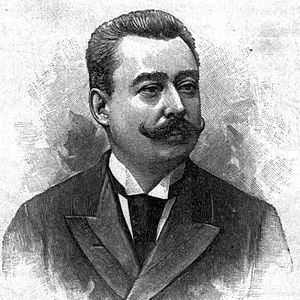- Christian de Bonchamps
-
The Marquis Christian de Bonchamps (1860–1919) was a French explorer in Africa and a colonial officer in the French Empire during the late 19th- early 20th century epoch known as the "Scramble for Africa", who played an important role in two of the more notorious incidents of the period.
Contents
The Stairs Expedition
Bonchamps served as a cavalry officer in France and then spent several seasons in North America, hunting in the Rocky Mountains. In 1891 he was appointed third officer of the Stairs Expedition which aimed to take possession of Katanga in Central Africa for the Belgian King Leopold II, with or without the consent of its king, Msiri.[1]
When treaty negotiations with Msiri reached a stalemate, Bonchamps proposed capturing Msiri and holding him hostage. Msiri typically had 300 armed warriors at his stockade, but Bonchamps had discovered that every night, he would leave with just a handful of guards to visit his favourite wife, Maria de Fonseca, at her compound nearly a kilometre away.[2]
Captain Stairs rejected the idea of the ambush in favour of an ultimatum, and this led to a confrontation in which Captain Omer Bodson shot Msiri dead. Bonchamps was the first of the other officers to reach the scene of the shooting, and it fell to him to restore order in the chaos and to evacuate the wounded, including the dying Bodson after he had been shot in turn by one of Msiri's men.[1]
In the aftermath, Bonchamps and most of the expedition was incapacitated by disease and starvation. Once relieved by another expedition, they suffered hardships and starvation on the return journey to Zanzibar. Bonchamps was in command of the expedition when Stairs was ill and after he died on the Zambezi. Only half of the expedition's total of 405 men survived.
After returning to Paris, Bonchamps gave his journal to writer Léon Delmas who, using the pseudonym René du Pont-Jest, published in the 1892-93 issues of the magazine Tour du Monde (World Tour), an account of the events, entitled L'Expédition du Katanga. In this magazine narrative, Bonchamps revealed that the expedition had cut off Msiri's head and hoisted it on a pole in plain view as a "barbaric lesson" to his people, a fact which the English account by Joseph Moloney omitted.[2]
The Fashoda Incident
In 1897 Bonchamps was appointed to lead a mission from Djibouti across Ethiopia to the River Nile at Fashoda in southern Sudan, to converge with the expedition of Major Jean-Baptiste Marchand coming from Brazzaville with orders to secure the area around Fashoda as a French protectorate.[3] The ultimate objective was an ambitious plan on the part of French government to establish an axis of French colonies across the continent from east to west, Dakar to Djibouti, in competition with the British Empire's Cape to Cairo vision of British colonies across the continent from north to south. Ethiopia, one of only two independent nations on the continent at that time, stood in the way of a French route, but its ruler Menelik II was friendly towards the French and they understood he would grant them passage.
The Ethiopian Highlands were too great an obstacle, however, and the Bonchamps Expedition suffered accidents and attacks from hostile tribesmen. In addition, although Menelik II was helpful up to a point, he ordered a halt to the expedition in December 1897. The Marchand Expedition reached Fashoda in July 1898, but the Bonchamps Expedition was unable to complete the journey.[4] In September, the Marchand Expedition was confronted by a British flotilla on the Nile leading to the Fashoda Incident, which eventually resulted in a diplomatic defeat for France and the withdrawal of the Marchand Expedition.
In 1892, upon returning from the Stairs Expedition which achieved its objectives for the Belgian king, Bonchamps said he regretted that his suffering had not been for France.[2] Five years later, provided with a similar opportunity, but different circumstances to serve his country, his mission was ultimately unsuccessful.
Lack of documentation of Bonchamps' life
Despite his public prominence in the 1890s, there is remarkably little reliable documentation detailing the relevant details of the life of Marquis Christian de Bonchamps. Neither the listing of his hereditary aristocratic title nor contemporary sources provide specifics regarding the year and place of his birth or the year and circumstances of his death. The 1971 reissue of the 1893 "René de Pont-Jest" text gave 1860 as the year of Bonchamps' birth and stated that he died in 1919, at the age of 58 or 59. There was no indication as to what role, if any, he may have played in the just-concluded World War I.
References
- ^ a b Moloney, Joseph A. (1893). With Captain Stairs to Katanga. London: S. Low, Marston & Company.
- ^ a b c Pont-Jest, René de (1893). L'Expédition du Katanga, d'après les notes de voyage du marquis Christian de BONCHAMPS, in: Édouard Charton (editor): Le Tour du Monde magazine, also published bound in two volumes by Hachette, Paris. Available online at www.collin.francois.free.fr/Le_tour_du_monde/
- ^ Michel-Côte, Charles (1900). Mission de Bonchamps: Vers Fachoda à la rencontre de la mission Marchand à travers l’Ethiopie (Bonchamps Mission: Towards Fachoda to the Meeting of the Marchand Mission Crossing Ethiopia). Paris: Plon.
- ^ Levering Lewis, David (1987, 1995). The Race to Fashoda, pages 133, 135 and 210. New York: Weidenfeld & Nicolson.
Categories:- Explorers of Africa
- French explorers
- 1860 births
- 1919 deaths
Wikimedia Foundation. 2010.

